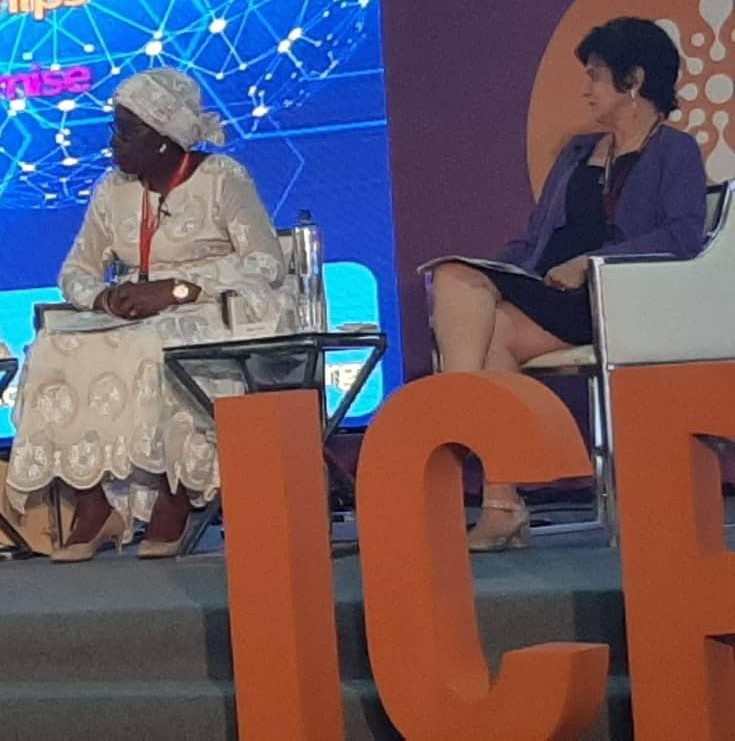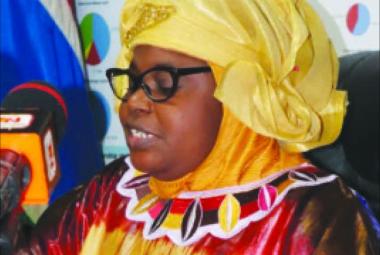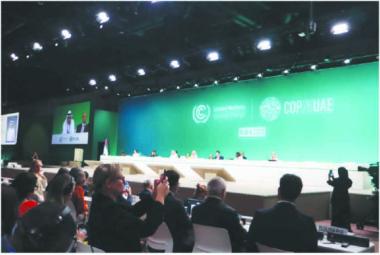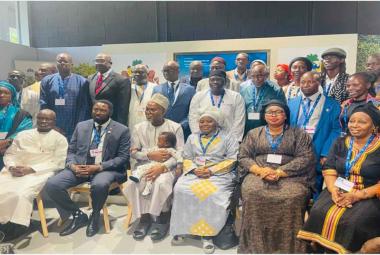Hon. Fatou Kinteh, Minister of Women, Children and Social Welfare participating in a panel discussion on SSTC
Talking points
- The importance of South-South Triangular Cooperation (SSTC)
- South-South Triangular Cooperation has gained increasing momentum globally.
- Over the years southern countries have acquired tremendous amounts of knowledge and resources through their national development processes. Such knowledge and resources are very relevant to attaining development objectives
- SSC is a very relevant development strategy towards the achievement of the national development goals and the SDGs.
- SSC is a very significant source of potential development resources that is yet to be fully tapped.
- South-South Cooperation (SSC) is the modality that ensures sustainability of the development programme because it is based on strong ownership by the organizations/agencies involved and mutual benefits
- Multilateral organizations like UNFPA and PPD need to step up in their facilitating role in promoting SSC. Efforts should be made for more southern countries to be aware of the need for SSTC to help accelerate the achievement of the ICPD goals.
- What has been the experience of The Gambia in South-South and Triangular Cooperation?
Over the years the Gambia has benefited from various capacity building initiatives through south-south cooperation. The trainings helped strengthen individual capacities in demography, public health administration and policy analysis. Through the initiative the Gambia was able to forge partnership with neighboring countries to improve service delivery in health and other sectors. Cross border activities were also conducted awareness creation on GBV and RH. We recognize the tremendous support from China, India, South Africa and Indonesia in building individual and institutional capacities within the framework of south-south cooperation
- What challenges has the country faced in conducting SSTC and what improvements to the process would you suggest?
The key challenges faced by Gambia in participating fully in SSTC are as follows:
- Limited financial and material resources
- Limited human resource capacity
- Bureaucratic bottlenecks
- What is the knowledge and experience you may wish to share with other partners through the SSC modality?
The audience would be interested to learn from The Gambia how a smaller developing country could also contribute to the pool of SSC solutions of the world. In addition, it would be useful if The Gambia makes suggestions on how to improve or accelerate the SSTC initiatives. (THE GAMBIAN EXPERIENCE):
- Addressing population and development issues continues to occupy center stage in The Gambia’s development efforts. In fulfilling and demonstrating our commitment to the ICPD-PoA, The Gambia in collaboration with partners, has over the years, enacted and implemented legislations, policies and programmes geared towards improving the quality of lives of Gambians. Such legislations and programmes include but not limited to: The National Population Policy, National Reproductive Maternal Neonatal Child and Adolescent Health Policy, National Family Planning Policy, National Social Protection Policy, National Migration Policy, Female Genital Mutilation, a curriculum on comprehensive sexuality education in schools and Gender Based Violence Acts;
- The establishment for the first time a Ministry of Women, Children and Social Welfare;
- In a bid to harmonize national legislations and hasten the implementation of the respective national, regional and international commitments on gender equality and women empowerment and elimination of all forms of discrimination against women and girls, the government in collaboration with partners has supported and promoted several programs including Training of law enforcement officers on GBV related instruments, sensitization of communities and circumcisers on the abandonment of FGM/C among others;
- Consequently, FGM/C and Child Marriage have been criminalized through amendment of women’s and children’s Act in 2015 and 2016 respectively. The National Gender Policy 2010 2020 with the objective of eliminating all forms of discrimination, including GBV was also developed;
- The Gambia has made significant achievements in attaining gender parity at basic levels of education. Young people especially girls are being funded by government to pursue higher levels of education;
- In relation to the financing for gender equality and the empowerment of women, Government with support from development partners and the private sector have over the years, implemented activities culminating in increase in women’s access to education, productive resources and credit. Significant increases have also been registered in the number of women in decision making positions e.g. in politics and increasingly women continue to occupy management positions in the civil and public service and the private sector;
- Action is also taken to enhance women’s participations in decision making through their appointment to senior position in government and the civil service. More women are also increasingly seeking elective posts in the National Assembly and local Authorities;
- In addition, The Gambia in its various development policies and programmes upholds the right of adolescents and youth to access information and services related to comprehensive sexual and reproductive health. The Gambia has taken steps to integrate adolescence and youths RH issues in the Health and National Population Policies and the National Development Plan;
- Various components of reproductive health recommended by the ICPD programme of action are being offered as a part of the primary health care programme. Integrated services are being offered in RCH/FP clinics, and service providers have been trained to offer such services;
- The Gambia government through the population programme has also improved access to quality sexual and reproductive health services through the provision of free contraceptive and maternal lifesaving drugs, improvements in road networks to address mobility constraints, refurbishment of health facilities and provision of- medical equipment and training for health service providers;
- The government has piloted a community-based project called the Kabilo Baama Initiative, with the aim of increasing awareness on detecting danger signs of pregnancies among members of the rural communities, ensuring male involvement in RH, ensuring early booking, timely pregnancy tests and antenatal care. The initiative also provides support for boosting the socioeconomic status of women in the targeted communities and reducing mortality and morbidity among mothers, infants and children;
- With this framework of engagement and creating opportunities, respective institutions provide relevant skills, entrepreneurial training, micro credit facility, leadership training, mentorship and apprenticeship to the youth. In addition, through various fora and affirmative actions, youths in the Gambia take active role in decision making across all layers of governance from the local to the national level where the youth are ably represented by themselves;
- In addition, the government through the National Youth Council has provided support to regional Youth Centers in a bid to accelerate access to Youth Friendly Sexual and Reproductive Health information and services for informed choices and decisions;
- The government has also set up structures to guide the coordination, monitoring and evaluation of programmes on population, RH, gender mainstreaming and women empowerment. Government has established coordination structures both at the regional and national levels to ensure effective coordination, monitoring and evaluation of development programmes. To show commitment to the ICPD POA the Gambia government has established a new Ministry for Women, Children and Social Welfare in addition to the structures;
- CHALLENGES
- Despite numerous gains registered in preventing harmful traditional practice, Women and girls continue to be disadvantaged because of sociocultural norms and practices as well as discriminatory provisions in customary law. Early marriage (23.8 per cent) continues to hamper the racialization of the potentials of adolescent girls, aged 15 – 19 years. Female Genital Mutilation / cutting among adolescent girls, stands at 76.3 per cent with high regional disparity;
- Poor access to family planning and RH information and services;
- Pro-natalistic culture
- Son preference
- Early marriage
- High level of unsafe abortion & resultant maternal mortality
- Poor data collection and utilisation
- Weak integration of population variables into development planning
- Weak regulatory mechanisms on the issuing of national documents
- KEY ACHIEVEMENTS
- These together with other health and other development interventions are a major contributing factor to the reduction in maternal mortality ratio from 1050 in 1993 to 730 in 2001 and 433 per hundred thousand life births in 2013. Despite the reduction, maternal deaths in the Gambia still remain high, surpassing the global average of 216 deaths per 100, 000 live births.
- The Gambia has also witnessed a sharp decline in both Infant and Child Mortality from 75 and 99 to 34 and 54 deaths per 1,000 live births during the period (2003 – 2013) respectively. Similarly, skilled attendants at birth and percentage delivery at health facilities have all increased significantly in The Gambia.
- Life Expectancy at birth has increased
- The total fertility rate has declined
- Overall mortality rates have declined
- Births attended by skilled birth attendants has increased from 54.6% to 57% between 2000-2010
- Antenatal care attendance increased from 97.8% to 98.1% between 2005-2010
- Formulation of a comprehensive economic policy for growth
- Formulation and revision of the National Population and health Policies and development of action plans
- Establishment of a National Population Commission and other coordination structures
- Integration of population issues into development planning
- Almost all the service delivery points are now offering at least four RH services (ANC, FP, VCT & delivery
- Family planning (FP), and adolescents/youth Sexual and RH issues are being addressed both at the levels of the institution and the communities
- Family planning services and prevention of parent to child transmission (PMTCT) are well-integrated into RCH services; and capacities have been built in these areas accordingly
- RH services integrated into the PHC system
- Increased awareness on HIV/AIDS
- Introduction of CSE in schools curriculum
- Conduct of successive population and housing census
- The establishment of the GAMINFO, a national web based database.
- Improvements in rural infrastructure, health, energy and educational facilities
- AIDS Council, Secretariat and a programme unit are formed
- Integration of HIV/AIDS into PHC and RH programmes
- National Women's Council and Bureau established by an Act of Parliament in 1980 Ratification and Harmonization of CEDAW in 1993
- Development of the National Action Plan on GBV and FGM/C 2012 – 2016
- Domestic Violence and Sexual Offences Act 2013
- Women’s Amendment Act 2015 prohibiting the practice of FGMC in The Gambia
- Develop and implement a National Action Plan on UN Resolution 1325 on Women Peace and Security
- Increase enrolment for the girl-child in both primary and secondary schools
- Strong collaboration and partnership between government and key CSOs in the area of sustainable development
- Recommendations
The panelist is expected to share the type of commitment he/she and his/her organization have made on South-South cooperation for the achievement of the ICPD PoA and the relevant goal/s of the SDGs.
- It is therefore extremely important to harness various avenues, including south-south cooperation to strengthen the capacity of national statistical institutions and develop sustainable systems for data collection, processing, dissemination and analysis.
- As southern countries, we should endevour to share best practices in the management of functional civil registration systems at national, sub-national and community level using existing traditional and local institutions to ensure the availability of relevant data for planning at all levels
- Within the global south, we should promote cooperation in building systems to ensure universal access to sexual and reproductive health services, through the provision of comprehensive sexual and reproductive health services for women and men, with particular attention to the needs of adolescents, youth, older persons, persons with disabilities and indigenous people, especially in the most remote areas.
- Support the efforts within the framework of SSC to eliminate preventable maternal mortality and neonatal mortality through ensuring that births are attended by skilled health personnel, and ensure universal access to prenatal and postnatal care and family planning, emergency obstetric and neonatal care, and management of pregnancy-related complications and preventable complications arising from unsafe abortion in order to protect the health and safeguard the lives of women, adolescent girls and neonates.
- through the framework of SSTC, we should Share experiences and best practices in implementing comprehensive sexuality education programmes, targeting both in and out of school youths
- Explore the potentials for SSC among developing countries in population and development within the existing international and multilateral cooperation initiatives and frameworks, and collaborations among centers of excellence and research institutions.
The ICPD25 Nairobi Summit calls for countries to redouble efforts to urgently deal with reproductive rights for women and girls. A Call to Action






